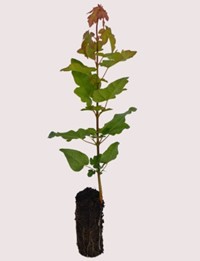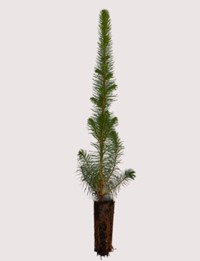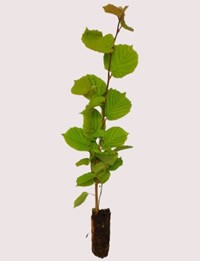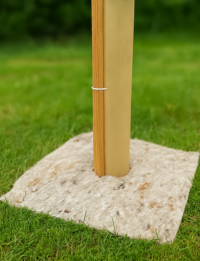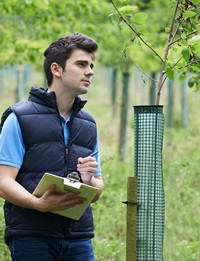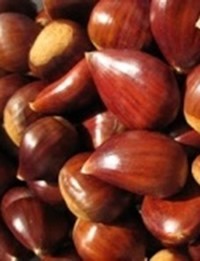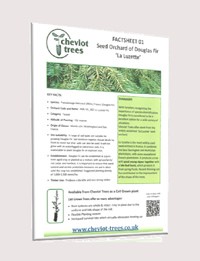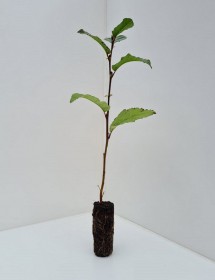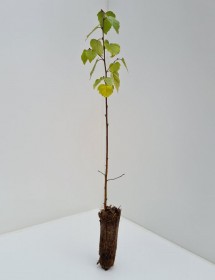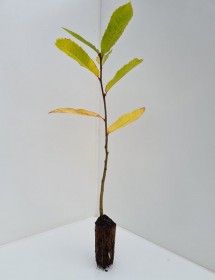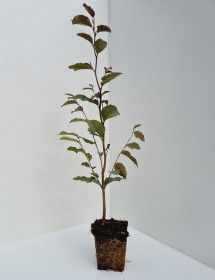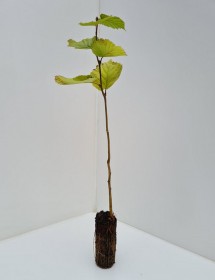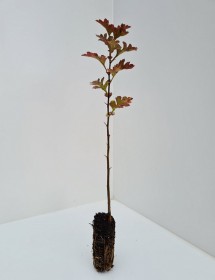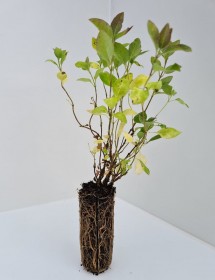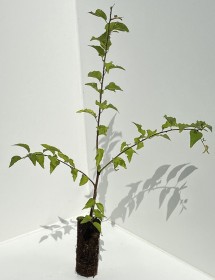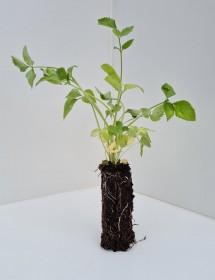
Cell Grown Plants
Every year our nursery in the Scottish Borders produces millions of cell grown broadleaves, conifers, shrubs, hedging plants and a range of other species for environmental planting. Our species range is extensive and we have species to suit all planting objectives.
Cell grown plants can be planted almost all year round and offer excellent survivability as they are supplied with a complete and intact fibrous root system.
-
Buxus sempervirens - Box
£2.13from £1.28The majority of the Buxus sempervirens - Box plants that we supply are used for hedging as it makes a fabulous formal hedge, but our clients also use it for planting as an understorey species in mixed woodlands or for game cover.
Evergreen with small, shiny dark green leaves. It is a very long lived species and can live for several hundred years.
-
Acer campestre - Field Maple
£1.52from £0.67Acer campestre - Field maple is a versatile and resilient fast growing small to medium sized tree that is also suitable for hedgerow planting.
It is a colourful species; the attractive five lobed leaves are flushed red in Spring, turning green and then yellow / gold in the Autumn. Deciduous. Native to the UK
Our cell grown Field Maple plants are often used for hedge planting either on their own or mixed with other species such as Hawthorn, Blackthorn, Hazel etc. Usually at a planting density of 6 plants per metre.
-
Calluna vulgaris - Native Wild Heather
£1.82from £0.81Calluna vulgaris - Native Wild Heather is the dominant heath plant in many parts of the UK. It has a wide range and is widely distributed throughout Europe as far North as the Faroe Islands.
Mauve pink flowers bloom from July to September which create a colourful scene in the countryside.
Native heather is an important source of food for butterflies and bees with hives often located on heather moorland in the Summer where the bees can easily obtain the nectar from the heather flowers to produce a very distinctive and much sought after ‘heather honey’.
The majority of the plants that we supply are used for heathland restoration projects in the countryside or on golf courses.
-
Acer platanoides - Norway Maple
£1.98from £0.88Acer platanoides - Norway Maple is a beautiful fast growing tree of large stature which is best suited to parkland or settings where its superb autumn colour can be fully appreciated.
Deciduous. Native to Central / Eastern but widely adapted to the UK. Norway Maple has a typical maple shaped leave which turns bright yellow in the autumn.
-
Cornus alba - Red Dogwood
£1.52from £0.67Cornus alba - Red Dogwood is a shrub that grows well in wet soils and is normally found along woodland edges and in hedgerows. It is a good choice for game cover.
Red Dogwood is grown mainly for its bright red stems. Deciduous with fresh green leaves that have distinctive curved veins. The leaves turn a rich crimson colour in the Autumn.
Creamy white flowers are produced in clusters which once pollinated by insects develop into small black berries which are eaten by birds and mammals.
Our cell grown Cornus alba - Red Dogwood plants are often used for hedge planting either on their own or mixed with other species such as Hawthorn, Blackthorn, Dog rose etc. at a planting density of 6 plants per metre.
-
Acer pseudoplatanus - Sycamore
£1.82from £0.81Acer pseudoplatanus - Sycamore. The marmite of forestry that needs little or no introduction. Undemanding, tolerant, and productive.
Deciduous. A native to central and southern Europe but is considered by some to be an honorary native to the UK. Simple, large green leaves and interesting grey, flaky bark.
We produce this species from multiple seed sources including an Improved seed source. The breeding work to produce the Improved seed was carried out by the Future Trees Trust.
-
Alnus cordata - Italian Alder
£1.70from £0.74Alnus cordata - Italian Alder is a fast growing, medium sized tree which grows in most soils except heavy clay. Tough and hardy with nitrogen fixing qualities. Often used on reclamation or hostile sites.
Bright green glistening foliage preceded by yellow catkins that appear in late winter. Ideal for forming a windbreak or for companion planting with species such as Douglas Fir and Sitka Spruce.
-
Cornus sanguinea - Common Dogwood
£1.52from £0.67Cornus sanguinea - Common Dogwood is a native shrub that grows well is wet soils and is normally found along woodland edges and in hedgerows. It is a good choice for game cover.
Deciduous with fresh green leaves that have distinctive curved veins. The leaves turn a rich crimson colour in the Autumn.
Creamy white flowers are produced in clusters which once pollinated by insects develop into small black berries which are eaten by birds and mammals.
Our cell grown Dogwood plants are often used for hedge planting either on their own or mixed with other species such as Hawthorn, Blackthorn, Dog rose etc at a planting density of 6 plants per metre.
-
Cotoneaster lacteus - Milkflower Cotoneaster
£1.93from £0.93Cotoneaster lacteus - Milkflower Cotoneaster is a dense evergreen shrub that can be used for an informal hedge or screen.
Its main attraction is the clusters of creamy white flowers which persist all summer and then masses of red berries are produced in the autumn and stay on the plant until the winter.
This species has a wide arching habit with large leathery leaves with deep veins which have a furry underside.
-
Alnus glutinosa - Common Alder
£1.52from £0.67Alnus glutinosa - Common Alder, is a medium to large sized tree liking a natural habit of damp ground near rivers and lochs, but it is equally found in mixed woodlands on drier ground.
-
Cytisus scoparius - Broom
£1.98from £0.88Cytisus scoparius - Broom is a large, native shrub that is often found on heathland, woodland and coastal areas.
It thrives in poor soil and is a useful plant for stablising soil.
It produces bright yellow flowers in the Spring which smell of vanilla. The flowers then ripen into seed pods which crack open in the Summer.
There are many different varieties of Broom but we produce the native type from seed.
-
Alnus rubra - Red Alder
£1.70from £0.74Alnus rubra - Red Alder shares many of the features of our native Common Alder and is ideal for forming a windbreak or for companion planting with species such as Douglas Fir and Sitka Spruce.
-
Empetrum nigrum - Crowberry
£1.93from £0.93Cheviot Trees are specialist producers of native moorland plants such as Empetrum nigrum - Crowberry.
A mat forming shrub with tiny purple, stalkless starry flowers that have stubby, needle like leaves. The fruit is a shiny black berry which is initially green, then turning pink, purple and finally black.
Often bound growing in acidic soils in shady, wet areas. Found on moors, bogs and wet slopes.
-
Betula pendula - Silver Birch
£1.52from £0.67Betula pendula - Silver Birch is one of the UK’s most well-known and hardiest native trees which offer so much interest due to its graceful habit and papery/peeling white bark with brown contrast.
Deciduous. A true pioneer species which rapidly colonises open areas and supports over 300 species of insect. Silver Birch is one of the most productive broadleaves species in Scandinavian countries and a multifunctional species for the UK. Excellent planted as a mixture with other species, superb as a windbreak and provides excellent quality firewood!
We produce this species from multiple seed sources including an Improved seed source. The breeding work to produce the Improved seed was carried out by the Future Trees Trust.
-
Erica tetralix - Cross leaved Heath
£1.93from £0.93The cross leaved heath is native to the UK and is often found on heathland and moors.
Shrubby in habit, it produces small pink bell shaped flowers that are produced in clusters at the end of its shoots. Narrow grey-green leaves which are arranged in fours around the stem, hence the name.
-
Betula pubescens - Downy Birch
£1.52from £0.67Betula pubescens - Downy Birch is probably one of the toughest native species. Its range extends into the artic, more northerly than any other broadleaved species!
Deciduous. It is similar in appearance to Silver Birch but has a more upright habit and a darker bark.
-
Eucalyptus dalrympleana - Mountain Gum
£2.13from £1.03Eucalyptus dalrympleana - Mountain Gum is one of the most popular species of Eucalypts grown in the UK due to its cold tolerance properties. A fast growing species which is very productive and adaptable to many purposes including biomass production, firewood, screening and foliage production.
Evergreen with ovate foliage which is copper tinged in colour when juvenile, turning blue/ green. Like most Eucalypts, the bark is often equally as impressive as the foliage and this species does not disappoint with shades of white and grey.
-
Carpinus betulus - Hornbeam
£1.82from £0.81Carpinus betulus - Hornbeam is an excellent versatile species which can either be used for forestry purposes or for hedging. If grown for hedging the leaves will stay on throughout most of the winter.
-
Euonymus europeaus - Spindle
£1.84from £0.89Spindle hedging plants provide a wonderful array of autumn colour. The four-lobed capsules burst into life with a vibrant shade of pink, opening to reveal orange fruits in the autumn. Euonymus europaeus hedging plants have dark green foliage that transforms into rich shades of red and yellow in autumn, adding another layer of colour to your garden. Spindle produces a dense hard wood that was traditionally used for making spindles and small implements.
A fast-growing species, Spindle is ideal for giving an array of colour to a hedge and is an excellent attractor of wildlife.
-
Castanea sativa - Sweet Chestnut
£1.98from £0.88Castanea sativa - Sweet Chestnut is a good example of a multi functional species. Excellent as a parkland tree, great for coppicing, and the chestnuts provide a tasty treat for red squirrels!
Native to Southern Europe but thought to be introduced by the Romans, Sweet Chestnut is found throughout the UK and is commonly associated with Southern England. Deciduous with long, narrow glossy leaves.
-
Fagus sylvatica atropurpurea - Copper Beech
£3.64from £2.18Fagus sylvatica atropurpurea - Copper Beech is a vibrant and stunning variety of Beech that forms a very large specimen tree in a parkland setting. Very eye catching and perfectly suited for hedge planting either on its own or mixed with Green Beech.
Smooth, silver grey bark. Deep purple leaves in the Spring and Summer turning yellow then copper in autumn. The leaves are retained on the plant during the winter if the plant is maintained as a hedge. If you are comparing Beech or Hornbeam for hedging and you have damp soil and or you are in a cold exposed area then we would suggest using Hornbeam.
-
Corylus avellana - Hazel
£1.82from £0.81Corylus avellana - Hazel is a small shrubby tree which is often found in mixed native woodlands and hedgerows.
It is well known for its long yellow catkins which appear in the Spring and then produces hazelnuts in the summer. Native to the UK.
Our cell grown Hazel plants are often used for hedge planting either on their own or mixed with other species such as Hawthorn, Blackthorn, Dog Rose etc. at a planting density of 6 plants per metre.
-
Ilex aquifolium - Holly
£3.34from £1.47A classic, native evergreen hedging plant, Ilex aquifolium - Holly growth rate is fairly slow at about 10-20cm a year, but what these hedging plants lack in speed, they make up for with seasonal interest and colourful foliage.
As a native hedging plant, Ilex is great for providing food and shelter to British wildlife. Birds such as blackbirds, chaffinches, robins and waxwings feast on the bright red berries and Holly plants provide a good source of nectar and pollen for bees. Holly hedging is the most beneficial to wildlife when left to grow naturally, as the bushy habit provides a safe, protected habitat
-
Crataegus monogyna - Hawthorn
£1.60from £0.70Crataegus monogyna - Hawthorn is the backbone of most British hedgerows and is one of the first species to produce new leaves in the Spring. If left untrimmed it will grow into a small tree with a very dense crown.
A very showy native species with fragrant, creamy white flowers in the Spring followed by green haws (berries) turning red in autumn.
Spiny, dense deciduous foliage which provides an excellent habitat for birds and insects.
Our cell grown Hawthorn plants are often used for hedge planting either on their own or mixed with other species such as Crab Apple, Blackthorn, Dog Rose etc. at a planting density of 6 plants per metre.
-
Juglans nigra - Black Walnut
£3.64from £1.73Juglans nigra - Black Walnut is a large fast growing species. We primarily grow this species for our forestry customers as the timber is highly valued, but it is also worth considering for its ornamental attributes.
Introduced to the UK from North America some 400 years ago, Black Walnut has a lot to offer.
The timber of Black Walnut is heavy, strong and durable with a value of 3-4 times that of Oak.
The foliage is pinnate with individual oval pointed leaflets which turn yellow in autumn.
Flowers appear in early Summer in the form of long catkins and in the Autumn the flowers turn to brownish green fruits that are around the size of a plum. The brown nut is held inside the husk.
We also produce Juglans regia - Common Walnut.
-
Ligustrum ovalifolium - Oval Leaved Privet
£1.93from £0.93Ligustrum ovalifolium – Oval leaf privet is a fast growing semi evergreen hedging species with glossy dark green leaves and creamy white flowers during the summer months.
A robust species which tolerates regular pruning. Also suitable for coastal locations although you may notice some defoliation during winter.
You may also wish to consider Wild Privet which has narrower leaves and a looser growing habit.
Creamy white flowers during the summer months.
-
Fagus sylvatica - Green Beech
£1.82from £0.81Fagus sylvatica - Green Beech is one of the most widely planted broadleaved trees in Europe. A long lived species that is commonly used in the UK as a component in a mixed woodland, for hedging or for parkland planting due its very broad crown.
Smooth, silver grey bark. Dark green leaves turning yellow then copperin autumn. The leaves are retained on the plant during the winter if the plant is maintained as a hedge. If you are comparing Beech or Hornbeam for hedging and you have damp soil and or you are in a cold exposed area then we would suggest using Hornbeam.
-
Juglans regia - English Walnut
£3.64from £1.73Juglans regia - English Walnut is a large fast growing species. A well known tree which was first introduced by the Romans who valued its nuts. Native from South-East Europe to South-west China.
Widely planted throughout the UK an it makes a fantastic and well shaped specimen for planting in parkland area, avenues, riverbanks and as a hedgerow tree.
The timber is equally as valuable as the nuts and can be used for furniture manufacture and veneer.
The foliage is shiny, pinnate with individual oval pointed leaflets which turn yellow in autumn.
Flowers appear in early Summer in the form of long catkins and in the Autumn the flowers turn to brownish green fruits that are around the size of a plum. The brown nut is held inside the husk.
We also produce Juglans nigra - Black Walnut.
-
Ligustrum vulgare - Wild Privet
£1.98from £1.22Ligustrum vulgare - Wild Privet is a bushy, native shrub that we often supply as part of a native hedge mixture but it is also useful on the edge of woodlands or as game cover due to its good tolerance of shade.
It is semi evergreen so provides useful cover and shelter for wildlife in the winter thanks to its relatively untidy and gnarly habit.
Semi evergreen with thin, green pointed leaves. Small white flowers are produced in the Summer with dark purple berries that follow in the Autumn.
You may also wish to consider Oval Leaf Privet which has larger oval leaves with better retention properties.
-
Lonicera nitida - Boxleaf Honeysuckle
£3.34from £1.47Lonicera nitida, commonly known as the Boxleaf Honeysuckle due to its small box type leaf that is pale green in colour.
It has as looser habit when compared against box so it should not be first choice for formal hedging but it is useful for planting on woodland edges as it offers good winter shelter and interest.
Fast growing and evergreen with small white flowers appearing in Spring.
-
Lonicera periclymenum - Honeysuckle
£3.34from £2.01Lonicera periclymenum - Honeysuckle is useful addition to a native hedgerow as it can easily scramble its way through the hedge, knitting everything together.
Deciduous. The main interest beings is the trumpet like flowers which attract wildlife in their masses. The flowers are sweet in fragrance are rich in nectar and are particularly attractive to moths.
Berries follow in the autumn which are eaten by birds who also use the dense branches as nesting sites.
You don’t need many Honeysuckle in a hedge to make an impact. A ration fo around 5% of your total mixture is more than sufficient.
-
Malus sylvestris - Crab Apple
£1.62from £0.70Malus sylvestris - Crab Apple is a good multi purpose native species. Good as part of a mixed hedge or woodland.
Deciduous. Glossy, oval leaves which has rounded teeth and sweetly scented blossom in the Spring which is pollinated by insects and bees. The pinky white blossom them develops into small, yellow-green apple like fruits.
Crab apple is an important food source for wildlife. The leaves are enjoyed by caterpillars of many moths, the flowers are an important early pollen source and the long lasting fruits are eaten by birds during the winter months.
-
Prunus laurocerasus - Cherry Laurel
£1.92from £0.93Prunus laurocerasus - Cherry Laurel is one of the most popular hedging plants in our range.
Fast growing, tolerant and easy to grow it is a superb choice if you need a solid screen. We also grow Portuguese Laurel which has a smaller more pointed leaf.
Cherry laurel does produce flowers and berries although these are quite insignificant as the main attraction is the large, dark green glossy leaves.
Its good tolerance of shade also makes it suitable for planting in open areas of woodland or on edges if shelter or cover is required.
3 plants per linear metre in a single row is normally sufficient to create a dense screen in time.
-
Platanus acerfolia - London Plane
£3.47from £1.65Platanus acerfolia - London Plane is extensively planted in Southern England as a street trees due to its tolerance for air pollution but it is considered to also be a useful forest tree for the UK as a result of climate warming.
A vigorous deciduous tree with distinctive flaky brown and grey bark.
London Plane has large bright green lobed leaves with interesting clusters of round fruits.
The timber is strong and widely valued for joinery / cabinetry.
-
Prunus lusitanica - Portuguese Laurel
£2.13from £1.03Prunus lusitanica - Portuguese Laurel has all the desirable properties of Cherry Laurel but has a smaller, pointed leaf.
Fast growing, tolerant and easy to grow it is a superb choice if you need a solid screen. It responds well to clipping and if desired, it is possible to achieve a very tight, formal hedge, more so than the Cherry Laurel - Prunus laurocerasus.
It does produce flowers and berries although these are quite insignificant as the main attraction is the large, dark green glossy leaves.
Its good tolerance of shade also makes it suitable for planting in open areas of woodland or on edges if shelter or cover is required.
3 plants per linear metre in a single row is normally sufficient to create a dense screen in time.
-
Rhamanus cathartica - Purging Buckthorn
£1.93from £0.93Rhamanus cathartica – Purging Buckthorn is a native small tree / large dense shrub with grey-brown bark and spiny branches.
Flowers are yellow green with four petals and are pollinated by insects. After pollination, the female flowers develop into black berries
Useful for woodland planting or hedging. The leaves of Purging Buckthorn are an important food source for tiger moth larvae and caterpillars of the Brimstone butterfly.
-
Populus Hybrid - Hybrid Poplar
£2.30from £1.03Populus Hybrid - Hybrid Poplar is a very versatile and vigorous clone which has been produced from natural plant breeding.
This clone will grow into a large tree with a stout stem. Ideal for wood fuel production, creating windbreaks and screening.
Deciduous with glossy green heart shaped leaves which turn brilliant yellow in autumn.
-
Rhamnus frangula - Alder Buckthorn
£1.93from £0.93Rhamanus frangula – Alder Buckthorn is a native small tree / large dense shrub
The outer bark is dark brown and unlike the Purging Buckthorn, the branches and stems are smooth and thornless. Star shaped flowers in the Spring with red berries following which then mature / darken to almost black in the Autumn.
Native to the UK and grows best in damp, acidic soils and open woods.
Useful for woodland planting or hedging. The leaves of Alder Buckthorn are an important food source for tiger moth larvae and caterpillars of the Brimstone butterfly.
-
Populus nigra - Black Poplar
£2.40from £1.35Populus nigra - Black Poplar is probably the rarest tree species in our range! Black Poplar is native to the UK and was once a common sight throughout the country but there are very few in existence.
Deciduous. Shiny green leaves which are heart shaped. Black Poplar is dioecious meaning male and female flowers are found on separate trees. The flowers are in the form of catkins which are red on male trees and yellow-green on females.
-
Rosa canina - Dog Rose (Pink)
£1.52from £0.67Rosa canina - Dog Rose is the only native Rose that we produce, and it is the most widely used as it is easy to grow and is adaptable to most locations.
Ideal for planting as part of a native mixture or on its own.
Deciduous with small green toothed leaves. Large and sweetly scented white or pink flowers appear in summer with red oval berry like hips forming in small clusters.
Dog Rose is a good choice for wildlife, offering protective shelter and habitat plus a good source of nectar for insects. Bird species such as blackbirds, redwings and waxwings eat the hips.
-
Populus tremula - UK Aspen
£1.82from £0.81Populus tremula - Aspen is a beautiful large fast growing tree which is native to the UK and the cooler regions of the northern hemisphere. It is characterised by its trembling and shimmering foliage.
Deciduous. Aspen is a very useful tree species which helps to stabilise soils, mitigate pollution plus it has a high ecological value for numerous insects and fungi. Aspen is a valuable and well regarded timber crop in Scandinavia for firewood, plywood manufacture and paper production.
We grow aspen from two different sources; a UK seed source and also a specific Scottish clonal collection. The latter option is more expensive than the generic UK source due to significantly higher propagation costs but it enables us to offer a reliable supply of plants from a Scottish origin.
-
Rosa rugosa Alba - Ramanas Rose (White)
£1.93from £0.93Rosa rugosa Alba - Ramanas Rose is a large robust shrub that produces large, beautiful and very fragrant bowl shaped flower that are silky white. It flowers earlier than our native Dog Rose and often repeat flowers during the Spring and Summer. Very large, red hips follow the flowers.
The stems are covered in small spines which makes it ideal for an impenetrable and dense hedge or barrier.
A good all rounder. Attractive, good disease resistance, fast growing and very tolerant of exposure and coastal locations.
We also produce Rosa rugosa which has fuchsia pink flowers.
-
Prunus avium - Wild Cherry
£1.93from £0.93Prunus avium - Wild Cherry is an attractive species not only aesthetically but also in commercial terms. The timber from Wild Cherry is highly valued in Europe with the top quality pieces destined for the veneer industry.
A large deciduous tree that requires plenty of space. Expect all year round interest with Wild Cherry. It has deep reddish brown shiny bark and the new bright green toothed leaves appear simultaneously with the long lasting clusters of white flowers. Once pollinated the flowers develop into globular shiny, deep red cherries. The leaves turn gold through to red in the Autumn to provide a spectacular show.
We produce this species from multiple seed sources including an Improved seed source. The breeding work to produce the Improved seed was carried out by the Future Trees Trust.
-
Prunus cerasifera - Cherry Plum
£1.70from £0.74Prunus cerasifera - Cherry Plum is a fast growing, dense hedging plant which is an excellent choice for providing shelter.
Masses of pure white flowers smother the branches in early March before the leaves appear and these are followed in autumn by tasty red or yellow, spherical cherry-plums. You can make jam, wines or even liqueurs from the fruits and it forms a very dense hedge of thorny twigs making it an extremely effective barrier.
The Cherry Plum is an excellent attractant and nectar source for bees and other beneficial insects.
Ultimate height 25 feet (7.5 metres). Can be trimmed to any height above 4 feet (120 cm). Average annual growth rate 1 - 2 feet (45 - 60 cm).
-
Rosa rugosa - Ramanas Rose (Pink)
£1.93from £0.93Rosa rugosa - Ramanas Rose is a large robust shrub that produces large, beautiful and very fragrant bowl shaped flower that are fuchsia pink in colour. It flowers earlier than our native Dog Rose and often repeat flowers during the Spring and Summer. Very large red hips follow the flowers.
The stems are covered in small spines which makes it ideal for an impenetrable and dense hedge or barrier.
A good all rounder. Attractive, good disease resistance, fast growing and very tolerant of exposure and coastal locations.
We also produce Rosa rugosa alba which has silky white flowers.
-
Sambucus nigra - Elder
£1.82from £0.81Sambucus nigra - Elder is a large, fast growing native species that is best planted as a woodland shrub. It is often found in hedgerows but it is often too thuggish for this purpose.
Green, pinnate leaves with oval and toothed leaflets.
The flowers are the main attraction with Elder; they are large and flat in a cluster like form, cream in colour and are highly scented. They provide nectar for insects and the base for a quintessentially British cordial!
After the flowers are pollinated by insects each flower develops into a small purplish black berry which ripens from late summer and are eaten by small mammals.
-
Prunus padus - Bird Cherry
£1.92from £0.93Prunus padus - Bird Cherry is native to the UK and we tend to associate it with the northern part of the UK.
Tough and resilient with lots of value for wildlife and it provides an excellent show in the Spring in the Autumn.
Deciduous. Green leaves more oval like in shape than Wild Cherry turning yellow and orange in Autumn.
Almond scented stalks of blossom in the Spring which provide a good early nectar and pollen source for bees. Once pollinated, the flowers develop into reddish brown cherries with a bitter taste which are stripped from the trees by birds.
-
Symphoricarpos albus - Snowberry
£1.93from £0.93Symphoricarpos albus - Snowberry is a dense shrub that is fast growing and very tolerant of shade and poor soils.
It is often used for screening and is often favoured by game birds as it provides shelter and security.
Deciduous with light green leaves. Small pink flowers in July that turn to pearl white berries in the Autumn.

